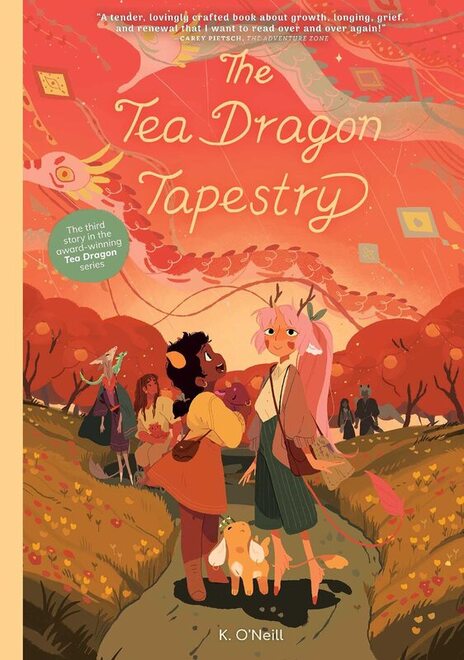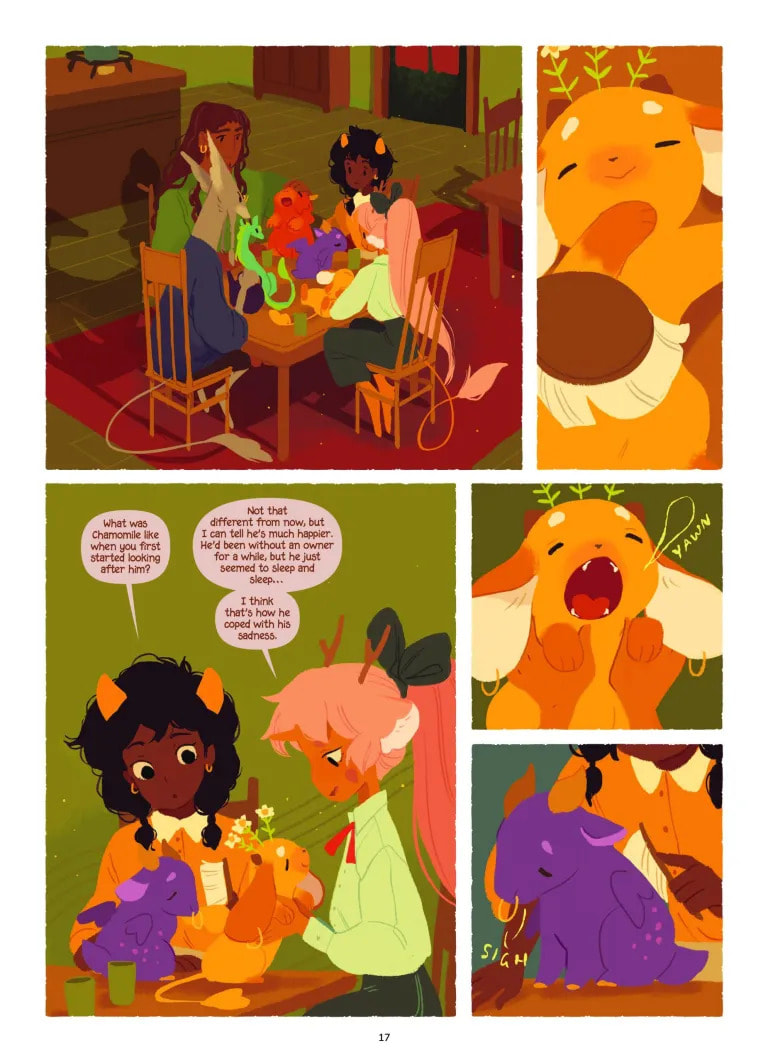|
The Tea Dragon Tapestry. By K. (Kay) O’Neill. Oni Press, ISBN 978-1620107744 (hardcover), 2021. US$21.99. 128 pages. For weeks, my family and I have been playing the Tea Dragon Society game Autumn Harvest, based on Kay O’Neill’s comics series (the first two books of which I’ve reviewed here, and here). I’ve won a few games and lost many. I enjoy the game; it’s happy and challenging and graced with beautiful graphics by O’Neill. The gameplay feels very much in tune with the ethos of the comics. In all this time, til now, I have not thought to read the third and final volume of the comics, The Tea Dragon Tapestry. I don’t know why. Maybe I just wasn’t ready for another dose of O’Neill’s gentle and affirming storytelling, another spell in the tea dragons’ idyllic fantasy world. The past year has been bruising, and I am tired. Or maybe I feared reading through it and having to leave it behind, too quickly. I’m glad to have read it, now. Tapestry is the most mournful, but then the most joyous, of the three books—the one that feels most like a healing for genuine hurt. As usual, the challenges and conflicts are conveyed with a tender, whispering lightness; O’Neill doesn’t push too hard. As usual, the mood is that of a communitarian, vaguely anticapitalistic pastoral: a utopia of cute and mystic creatures, some humanoid, some not, living, giving, and crafting in a spirit of contemplative harmony. You know, I really am sad to have to leave this world behind—fortunately, a book can always be reopened. O’Neill’s tea dragons (in fact, small, catlike creatures whose bodies grow tea leaves) live symbiotically with people in an unforced arrangement that exemplifies commensalism and loving attachment. O’Neill’s humans (in fact, a range of anthropomorphic characters, such as fauns and centaurs) serve as caregivers to the dragons, as well as crafters, each devoted to a specific discipline that benefits their village community and the larger world. Scenes of brewing and drinking tea punctuate the stories, evoking an unhurried life defined by discreet rituals and communal care. In Tapestry, one of the tea dragons, Ginseng, mourns the loss of her previous caregiver, while Ginseng’s current caregiver, Greta, struggles to figure out how to help her. Meanwhile, Greta’s friend Minette, uprooted from what she thought her life was going to be, mourns the life she used to have while trying to commit to and find joy in the way she lives now. At the same time, Kleitos, a peripatetic blacksmith, considers taking Greta on as an apprentice (again the emphasis on crafting) but mourns the fact that he has lost the joy that smithing once brought him. O’Neill’s major characters all suffer from dislocation or loss, and each is quietly bereft in their own way, but they cope with these feelings in the context of a loving, sustaining community. As ever, O’Neill’s storytelling is empathetic, understated, and rooted in everyday routines rather than bombastic and action-filled. And, as ever, the drawing is gorgeous: O’Neill renders their characters and settings without containing contour lines, as blocks of color. The colors are solid, not painterly, but often mixed with such subtlety that it helps to read the book under a bright light. O’Neill’s cartooning is sweet and elegant rather than rowdy or assertive, dedicated to form rather than line. The net effect is like that of a Miyazaki-esque ecofantasy art-directed by Mary Blair. Works for me—I have to admit, I love looking at these pages. When I reviewed the previous books in the series, I was rather too grumpy, complaining that their subdued, gentle approach made genuine high-stakes conflict impossible—that the books were too Edenic, too idealized, and unwilling to deal with the tough stuff. I recant those remarks! The conflicts are there; you just have to lean in close and look and listen carefully. The gentleness is intentional, but there is a critical intelligence at work too; the world conjured in these books offers ways to envision a better world of our own. The Tea Dragon series is a remarkable thing. I gather O’Neill has finished with the series, and I can only say, damn, that’s a shame—I’d love to spend more time in this bucolic yet urgently humane story-world. The game helps.
0 Comments
Your comment will be posted after it is approved.
Leave a Reply. |
Archives
June 2024
|




 RSS Feed
RSS Feed
